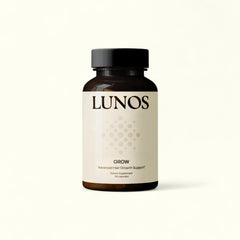Hair loss can feel confusing and overwhelming. Is it stress? Genetics? Hormones? While all of those factors can play a role, one of the most overlooked causes is also one of the easiest to address: nutrient deficiencies.
Your hair follicles are among the most metabolically active cells in your body. They need a steady supply of vitamins, minerals, amino acids, and other nutrients to grow strong, healthy hair. When those nutrients are missing, your hair is often the first thing to suffer.
Here are five telltale signs that your hair loss might be nutrient-related—and what you can do about it.
1. Your Hair Is Shedding More Than Usual
What's happening:
Finding a few strands on your pillow or in the shower is normal. But if you're noticing clumps of hair falling out when you brush, wash, or even just run your fingers through your hair, that's a red flag.
The nutrient connection:
Deficiencies in iron, biotin, vitamin D, and protein are all linked to excessive shedding. Iron, in particular, is critical for hair growth—without enough of it, your follicles can't produce new strands efficiently.
What to do:
Get your iron and ferritin levels checked (ferritin under 40 ng/mL can impact hair growth, even if you're not technically anemic). Consider adding a comprehensive hair supplement with biotin, vitamin D3, and amino acids like L-cysteine and L-methionine.
2. Your Hair Feels Thin, Weak, or Brittle
What's happening:
Your hair breaks easily. It feels fragile, lacks volume, and doesn't hold styles the way it used to. When you look closely, individual strands seem thinner than they once were.
The nutrient connection:
Hair is made of keratin, a protein built from amino acids. If your body isn't getting enough protein or the specific amino acids needed to build keratin (like cysteine and methionine), your hair literally can't form strong, thick strands.
Additionally, silica (found in bamboo and horsetail extract) strengthens the hair shaft and improves elasticity. Without it, hair becomes brittle and prone to breakage.
What to do:
Increase your protein intake and look for supplements with hydrolyzed collagen, MSM, and silica-rich botanicals like bamboo extract. These provide the building blocks your hair needs to grow strong.
3. Your Scalp Feels Dry, Flaky, or Itchy
What's happening:
You're dealing with dandruff, dryness, or irritation—even though you're using good shampoo and conditioner. Your scalp might feel tight, uncomfortable, or inflamed.
The nutrient connection:
A healthy scalp is the foundation for healthy hair. Deficiencies in omega-3 fatty acids, zinc, and B vitamins can lead to scalp inflammation, dryness, and poor circulation—all of which disrupt the hair growth cycle.
Zinc, in particular, plays a critical role in regulating oil production and reducing inflammation. Low zinc levels are strongly associated with both hair loss and scalp issues.
What to do:
Make sure you're getting adequate zinc (10 mg daily), selenium, and B vitamins like B12. Omega-3s (from fish oil or algae) can also help calm inflammation and support a healthy scalp environment.
4. Your Hair Growth Has Stalled
What's happening:
Your hair used to grow steadily, but now it seems stuck at the same length. Even after months of "trying to grow it out," you're not seeing progress.
The nutrient connection:
Hair grows in cycles, and the anagen phase (active growth phase) can be shortened by nutrient deficiencies. If your body doesn't have the vitamins and minerals it needs to support active follicles, hair shifts into a resting phase prematurely—resulting in slower growth and more shedding.
Vitamin D, biotin, and collagen are all essential for maintaining a healthy anagen phase and promoting continuous growth.
What to do:
Check your vitamin D levels (optimal range is 40-60 ng/mL for hair health). Add a supplement that supports the full hair growth cycle, including collagen to nourish follicles and biotin to support keratin production.
5. You've Recently Changed Your Diet or Gone Through a Stressful Period
What's happening:
You've been dieting, eating less protein, going vegan, or dealing with major life stress (pregnancy, illness, surgery, emotional upheaval). A few months later, your hair starts falling out.
The nutrient connection:
Hair loss often lags behind the triggering event by 2-3 months. If your body was deprived of key nutrients during a stressful period—or if stress depleted your nutrient stores—you might not see the impact on your hair until weeks or months later.
This type of hair loss is called telogen effluvium, and it's almost always linked to nutritional stress, physical stress, or both.
What to do:
If you've recently experienced any major dietary or lifestyle changes, prioritize nutrient replenishment. Focus on protein, iron, B vitamins, and adaptogens (like ashwagandha) to support your body's recovery. A high-quality hair growth supplement can help bridge the gap while your diet stabilizes.
The Bottom Line
If you recognize yourself in any of these signs, there's good news: nutrient-related hair loss is reversible. Unlike genetic hair loss, which requires more aggressive intervention, deficiency-driven shedding and thinning can often be corrected with the right nutrition and supplementation.
The key is addressing the root cause—not just masking symptoms with topical treatments.
A comprehensive hair growth supplement should include:
- Hydrolyzed collagen (for keratin production)
- Biotin and B vitamins (for follicle health)
- Silica from bamboo or horsetail (for strength and elasticity)
- Zinc and selenium (for scalp health and hormone balance)
- Amino acids like L-cysteine and L-methionine (the building blocks of hair)
- Vitamin D3 (to support the growth cycle)
When you give your body the nutrients it needs, your hair can return to its natural strength, thickness, and growth rate.
Ready to support your hair from the inside out?
Explore Lunos GROW—a luxury hair growth supplement designed to address the 8 major causes of thinning hair, including nutrient deficiencies, hormonal imbalance, and oxidative stress.
Because your hair deserves better than guesswork.



